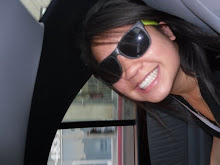Last Monday, I took the first dive; head first, naturally. So this is what graduate school feels like...
Getting into the swing of things is probably just as difficult, if not even more so, than coping with the middle of the semester or end of the year. I thought I’d be used to it by now, having begun five new semesters already. However, this semester was no different, especially since I am juggling this graduate degree with undergraduate courses and extracurricular activities. But overall, it was refreshing to come back to school despite the amount of work that is definitely looming in the very near future. I don’t think the looming clouds are helping anything either.
Monday’s speaker, Jeff Cole, was extremely interesting to listen to with his perspectives about technology implemented in the future; so much in fact that I caught myself talking to my friends about his opinions in everyday conversation. I was lucky enough to catch Jeff Cole once already last semester in Karen’s undergraduate CMGT 456 class. Even though some of his points were re-stated, it was a much-needed reminder and an impactful way to really emphasize the take-away points.
There were dozens of really interesting points that really resonated with me as I was listening. It was fascinating to learn that Walter Annenberg sold TV Guide for $3 billion dollars in 1990 and helped us inadvertently become who we are today. Because without Annenberg, which I’ve grown to love and appreciate so much for all of the resources we can take advantage of, I would not be the same USC student. And the funny thing is that $3 billion on top of inflation turned out to be less than $1.00 less than two decades later. Perhaps “funny” isn’t the right word, but at least Walter Annenberg laughed all the way to the bank.
Not only did we benefit with the construction of the Annenberg school, but we also directly owe the APOC graduate school route to Walter Annenberg’s grandson who happened to find a passion in technology pursuits. In my opinion, his passion was in the right place, because web and online technology is the future. Many people, regardless of age, nationality, or income level, all focus some parts of their life around the internet.
When I was elaborating about the lecture with a couple friends after class, we discussed how most people do not like too many options on TV. With cable TV’s emerging popularity, owning 400+ channels is no longer a rarity. In fact, some people expect at least that many channels on plasma big screens mounted on their walls in large, over-the-top theatres. But when research showed that about 90% of what we watch stems from only about 6 channels, I begin to wonder whether paying for all of these channels is really worth it. Then we linked a connection in class between restaurant satisfaction and menu variety. Even though studies show that people prefer small, more select menus, I like having a list of options to choose from. I laughed when my friend associated really pricy, sought out restaurants with typically smaller menus.
After the lecture, I’m genuinely excited to see the future of technology in that all of our content will be floating “in the clouds”. I’m not as wary about technology taking over our lives, because I think in a sense, it already has. Physical space for CD, DVD, and even Blu-Ray storage will be unnecessary – and I can’t imagine telling future generations what technology was like “back in my day…”
Monday, January 18, 2010
Subscribe to:
Post Comments (Atom)

Nice post -- that Annenberg story is a great one.
ReplyDelete